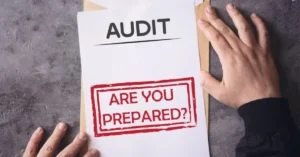By making a charitable donation, others benefit, but so do you. The federal government gives charitable organizations and donors favorable tax treatment to support charities.
Charitable contributions are tax-deductible, so taxpayers may reduce their tax obligation by claiming an itemized deduction on their tax return based on the cash or fair market value of the donation (with a few exceptions). Taxpayers often increase their charitable donations right before the end of the year.
However, sometimes these deductions are denied by the IRS. If you are claiming a charitable contribution deduction, it is essential to be aware of the acknowledgment rules. Our guide will help you understand how to show proof of a charitable donation.
The Basics of Charitable Deductions

Generally, if you itemize your deductions on your tax return, you are allowed to deduct “up to 50% of your adjusted gross income“. However, 20% and 30% of limitations apply in certain cases.
Choose your charity wisely. According to the IRS, you are allowed to deduct charitable contributions that you make only to qualified organizations.
If you’re not sure, visit the IRS Exempt Organizations Select Check. Otherwise, you will get to keep the warm feeling of generosity, but not the deduction.
The charity you give to must be a tax-exempt 501(c)(3) organization or fall under Section 170(c) of the IRS.4. This includes organizations such as:
- Tax-exempt educational organizations
- Tax-exempt educational organizations
- Certain government agencies
- Religious organizations covered under Section 170(c)
- Organizations such as Goodwill, the Red Cross, or the Salvation Army
- Some membership organizations, if they receive more than a third of their contributions from the general public.
Timing is also important. You can deduct your charitable donation in the year that you make it.
You have paid a donation when the check is in the mail or when the donation is charged to your credit card (not when you pay the credit card bill.) You may pledge a donation, but remember that a pledge is just a promise, so there is no deduction until you actually make the donation.
How to Show Proof of a Charitable Donation

You must keep records to prove the amount of the contributions you make during the year. The kind of records required depends on the number of contributions and whether they are cash contributions, noncash contributions, or out-of-pocket expenses incurred when donating your services.
If you donated cash or a monetary gift, you must have written confirmation from the charity to claim the deduction. The confirmation must state the name of the organization, the date you made the gift, and the amount.
It must also state the value of anything you received in exchange. You do not have to file the written confirmation with your return, but if you are audited and can’t produce it, the IRS may deny your deduction, even if the donation and the amount are not in question.
Charities must provide a written acknowledgment for donations over $250, but generally, most charities provide some type of receipt regardless of the amount. If they do not, ask for one.
The IRS says that if you do not have a receipt, a canceled check or bank records can substantiate contributions of less than $250, but if you just drop a donation in a collection box without getting a receipt, the IRS won’t take your word for it.
Documents
You must file IRS Form 8283 and attach it to your tax return if you claim more than a $500 non-cash donation. Complete Section 1 if the item’s value was between $501 and $5,000.
If it was worth $5,001 or more, the charity must complete part of the form. In certain cases, you must attach a qualified appraisal of the property.
Careful preparation can make all the difference when claiming a charitable deduction. For example, you should carefully review Form 8283 to ensure that it is complete and signed.
Substantial compliance with the rules of acknowledgment is not enough. The IRS is unforgiving when it comes to charitable contributions.
Therefore, if you are being audited and have a written acknowledgment, but the acknowledgment does not contain the required “no goods or services” language, the IRS can deny the deduction.
Planning your charitable donations is important, particularly if an appraisal is required. Appraisals must be obtained prior to claiming the deduction, and they may take some time. If an appraisal is required, it is a good idea to check with your tax advisor to confirm that the appraisal meets all requirements.
IRS Penalties
If the IRS determines that you have overstated tax deductions and therefore have understated your tax liability, they will assess a penalty. The IRS may charge 20% of your total deduction amount if:
- You owe more than 10% of the amount, or
- If the amount understated for the total tax liability exceeds $5,000.
However, if you fraudulently tried to decrease your tax liability, the penalty is 75%. If you don’t pay the penalty, there will be a 0.5% penalty for each month beyond the due date, with a maximum of 25% of your owed amount.
What If the IRS Denies Your Charitable Donation Deduction?

The IRS may deny your charitable donation deduction on several grounds, such as the organization did not qualify as a charitable organization, the amount did not represent fair market value, or the donation was not properly substantiated.
If denied, you will receive a letter of proposed tax adjustment. The taxpayer may request a conference with an appeals officer.
This may be either a small case request or a formal written protest. A small case request is appropriate if the total amount of tax, penalties, and interest for each tax period involved is $25,000 or less.
Make sure you send a formal protest within the time limit specified in the letter. It must include detailed information about the proposed tax adjustment, the subject of disagreement and supporting facts or law, and must be signed by the taxpayer under penalty of perjury.
If the taxpayer does not want to appeal within the IRS, the taxpayer may take the case to tax court.
The IRS will also send a letter to any company, business, or individual concerning an audit. The agency will never call you to initiate an audit or make a demand to collect taxes.
Note that calls, emails, or texts from persons claiming to be with the IRS and demanding money for unpaid taxes are scams. Getting a notice from the IRS can be upsetting.
There are two types of audits: via mail and in-person. According to the IRS, in 2018, 74.8% of the audits were correspondence audits.
Do not lose or throw away the IRS letter, because it contains valuable information, such as what documentation will be needed. You should consult a qualified attorney before putting anything in writing.
In-Office Interview
The IRS may request that you come to their office and bring your documents (known as an office audit). In some cases, interviews are conducted at a field audit, in which the IRS meets you at your home, place of business, or your tax preparer’s office.
Regardless of the circumstances, here are some basic rules:
- Before the audit, gather all the records that pertain to the issue. However, do not give the auditor more information than they request.
- Answer questions honestly, but only keep your answers brief and to the point. If you don’t know, say so. Don’t make answers up.
- Give the auditor copies, not original documents, and keep a record of everything you submit.
- Always act in a professional manner. Remain calm and cooperative, but don’t engage in casual conversation. Chatting with the auditor won’t help you, and it may harm you. Request copies of any information in the auditor’s files.
- Consult a tax attorney. Their skill and experience are invaluable, and they can represent you in front of the IRS or at any subsequent litigation.
- If the audit determines you owe additional taxes, the IRS Collection Process will begin. First, the agency will send you a bill, which will include the taxes owed, plus interest and penalties.
Conclusion

When substantiating a charitable donation, attention to detail and meticulous record-keeping is essential. If the IRS is challenging your charitable donation, you don’t have to fight it alone.
At Silver Tax Group, we assess your situation and determine the best approach for your tax problem. For more information or a free case evaluation, call 855-900-1040 or contact us online today.






